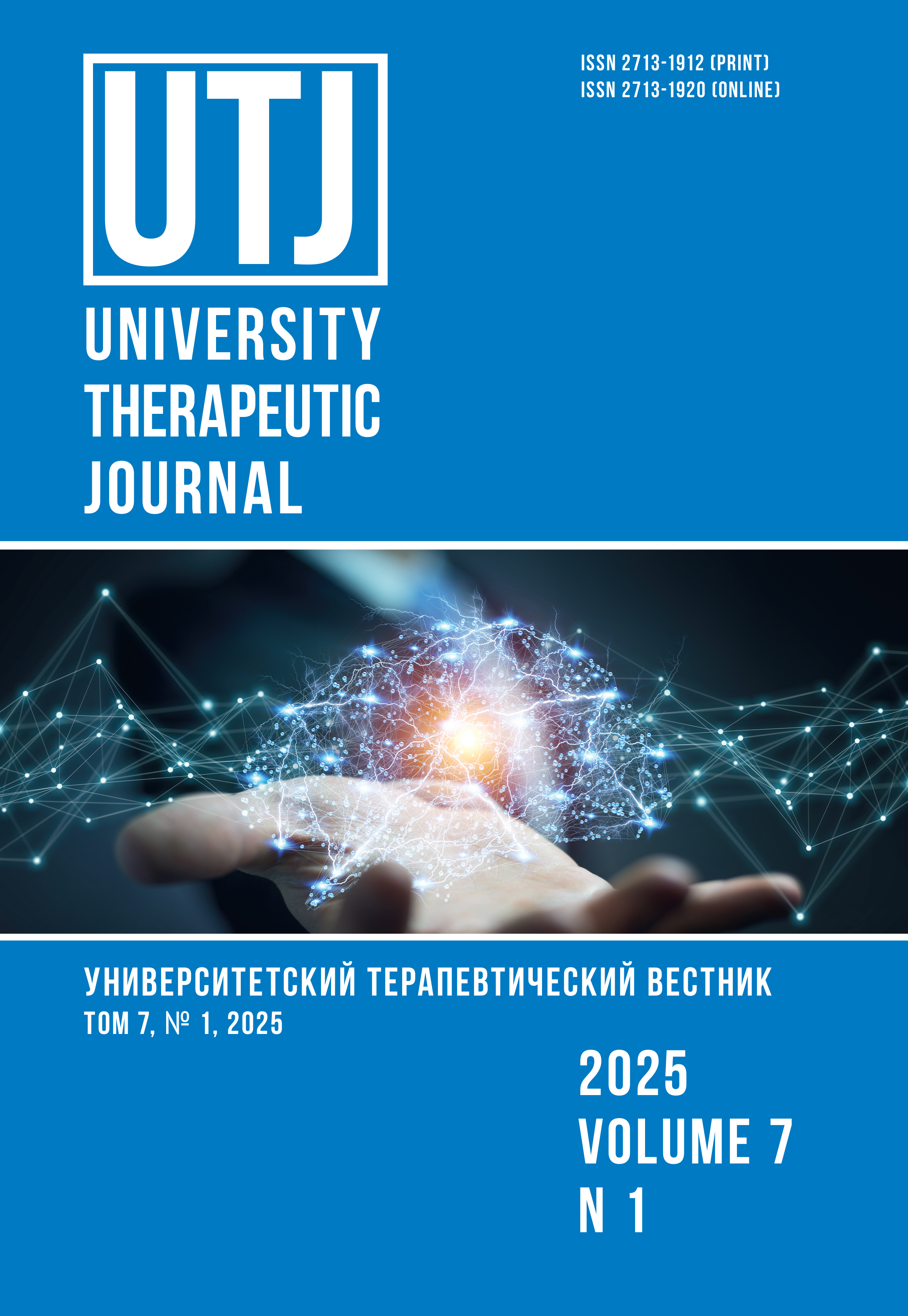FOOD ADDICTION: NEUROBIOLOGY OF EMOTINAL EATING
Abstract
The problem of food addiction and emotional overeating is becoming increasingly relevant in modern conditions, given the significant increase in the number of patients with eating disorders. These disorders are often associated with personality traits such as fear of social contact, avoidance of responsibility and dependence on others. From the point of view of neurobiology, one of the key systems for regulating eating behavior are the dopaminergic, endocannabinoid, serotonergic and dopaminergic systems. Some foods have the ability to cause effects similar to the effects of psychoactive substances. Eating disorders are classified as mental disorders. Food addictions are a complex combination of biological, psychological and social factors. Their treatment requires a deep understanding of the neurobiological mechanisms, as well as consideration of individual personality characteristics and emotional state. An integrated approach, including medical.
References
Барабаш П.И. Стратегический подход и алгоритмы рационального питания при психологической коррекции избыточного веса. Концепт. 2013;5(21):8–12.
Randolph T.G. The descriptive features of food addiction. Addictive eating and drinking. Q. J. Stu. Alcohol. 1956;17(2):198–224.
Менделевич В.Д. Руководство по аддиктологии. СПб.: Речь; 2007.
Змановская Е.В. Девиантология. Психология отклоняющегося поведения. Учеб. пособие для студентов высших учебных заведений. 2-е изд., испр. М.: Академия; 2004.
Кружилина А.А. Психологические характеристики расстройства пищевого поведения. Modern Science. 2021;11(2):225–228.
Коннер М. Армитейдж К. Социальная психология пищи. Х.: Гуманитарный Центр, 2012:264.
Gupta A. Osadchiy V. Mayer EA. Brain-gut-microbiome interactions in obesity and food addiction. Nat Rev Gastroenterol Hepatol. 2020;17(11):655–672.
Constant A. Moirand R. Thibault R. Meeting of Minds around Food Addiction: Insights from Addiction Medicine, Nutrition, Psychology, and Neurosciences. Nutrients. 2020;12(11):35–64.
Campana B. et al. Obesity and food addiction: similarities to drug addiction. Obesity Medicine. 2019:100–136.
Liu C.M. et al. Central oxytocin signaling inhibits food reward-motivated behaviors and VTA dopamine responses to food-predictive cues in male rats. Hormones and behavior. 2020:104855.
Murphy C.M. Stojek M.K. Mac Killop J. Relationships between impulsive personality traits, food addiction and body mass index. Appetite. 2014;73:45–50.
Guleken Z., Uzbay T. Neurobiological and neuropharmacological aspects of food addiction. Neurosci Biobehav Rev. 2022;139:104760.
Hyldelund N.B. Dalgaard V.L. Byrne DV. Why Being 'Stressed' Is 'Desserts' in Reverse-The Effect of Acute Psychosocial Stress on Food Pleasure and Food Choice. Foods. 2022;11(12):1756.
Бессолицына Р.М. Клабукова И.К. Абросимова М.А. и др. Изучение особенностей пищевого поведения у пациентов с различными индексами массы тела и ожирением. Вятский медицинский вестник. 2024.
Giannaccini G. Betti L. Palego L. et al. The expression of platelet serotonin transporter (SERT) in human obesity. BMC Neurosci. 2013;14:128.
Каплан Гарольд И. Клиническая психиатрия: из синопсиса по психиатрии. Пер. с англ. В.Б. Стрелец. 2002.
Wong A.M. Carpenter C.L. et al. Association of dopamine D2 receptor and leptin receptor genes with clinically severe obesity. Obesity. 2013;21(9):467–473.
Parker K.E. et al. Central amygdala opioid transmission is necessary for increased high-fat intake following 24-h food deprivation, but not following intra-accumbens opioid administration. Behavioural brain research. 2014;131–138.
Dana M. Small, Robert J. Zatorre et al. Changes in brain activity related to eating chocolate: From pleasure to aversion. Brain. 2001;124(9):1720–1733.
Успенский Ю.П., Фоминых Ю.А., Наджафова К.Н. Патогенетические аспекты развития желчнокаменной болезни у больных с метаболическим синдромом. Терапевтический архив. 2021;93(2):209–214.
Dong T.S., Mayer E.A., Osadchiy V. et al. A Distinct Brain-Gut-Microbiome Profile Exists for Females with Obesity and Food Addiction. Obesity. 2020;28(8):1477–1486.
Macht M., Mueller J. Immediate effects of chocolate on experimentally induced mood states. Appetite. 2007;49(3):667–674.
Berridge K.C., Kringelbach M.L. Pleasure systems in the brain. Neuron. 2015;86(3):646–664.
Елиашевич С.О., Нуньес Араухо Д.Д., Драпкина О.М. Пищевое поведение: нарушения и способы их оценки. Кардиоваскулярная терапия и профилактика. 2023;22(8):36–63.
Treasure J., Duarte T.A., Schmidt U. Eating disorders. Lancet. 2020;395(10227):899–911.
Institute of Health Metrics and Evaluation. Global Health Data Exchange (GHDx). Доступен по: https://vizhub.healthdata.org/gbd-results/ (дата обращения: 11.01.2025)
The American Psychiatric Association Practice Guideline for the Treatment of Patients With Eating Disorders, 4th Edition. (перевод Яковлевой Я.В., научная редактура: Касьянов Е.Д.). 2023;112.
Драпкина О.М., Концевая А.В., Калинина А.М. и др. Профилактика хронических неинфекционных заболеваний в Российской Федерации. Национальное руководство 2022. Кардиоваскулярная терапия и профилактика. 2022;21(4):32–35.
Pook M., Tuschen-Caffier B., Stich N. Evaluation des Fragebogenszum Figurbewusstsein (FFB, Deutsche Version des body shape questionnaire). Verhaltenstherapie. 2022;12(2):116–124.
Karlsson J., Persson L.O., Sjöström L. et al. Psychometric properties and factor structure of the Three-Factor Eating Questionnaire (TFEQ) in obese men and women. Results from the Swedish Obese Subjects (SOS) study. International Journal of Obesity. 2000;24(12):1715–1725.
Van Strien T., Frijters J.E.R. et al. The Dutch Eating Behavior Questionnaire (DEBQ) for assessment of restrained, emotional, and external eating behavior. International Journal of Eating Disorders. 1986;5:295–315.
Wurst R., Brame J., Ramsenthaler C. et al. A questionnaire to assess eating behavior: structure, validity and responsiveness of a new German eating behavior scale. Appetite. 2022;168.
Тювина Н.А., Вербицкая М.С., Столярова А.Е. Атипичная депрессия: критерии выделения, систематика, подходы к терапии. Неврология, нейропсихиатрия, психосоматика. 2020;12(2):98–103.
Garner D.M. Olmsted M.P. et al. The Eating Attitudes Test: Psychometric Features and Clinical Correlates. Psychological Medicine. 1982;12:12871–12878.


